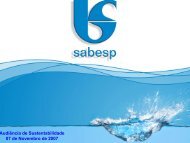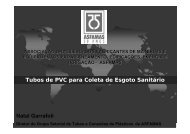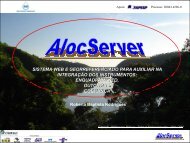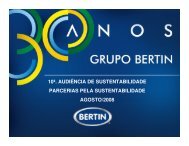Sustainability r e p o r t - Sabesp
Sustainability r e p o r t - Sabesp
Sustainability r e p o r t - Sabesp
Create successful ePaper yourself
Turn your PDF publications into a flip-book with our unique Google optimized e-Paper software.
Selective collection in the East Metropolitan Area Business UnitWe should highlight the work developed at the East Metropolitan Area Business Unit,which in 2009 collected 23.75 tonnes of 6 types of recyclables, of which 13.36 tonnes wereinternally generated and 10.39 tonnes were brought by employees and the community.From this total, 7.92 tonnes were auctioned and 15.83 tonnes were donated to thecooperative Vitória da Penha, which supports 50 families.View of the Guaraú WTP.The PEA, a corporate, general guidance program, was developed to meet thesegoals. Some of the main initiatives developed are the corporate procedure,the methodology and the mechanisms for the management of a set of ongoingEnvironmental Education actions and projects.PEA was launched in October 2009 in a large event attended by over 500 people,including several industry leads and experts, invited by us. To advance thequalification process, in 2009 we conducted 2,961 hours of in-class EnvironmentalEducation courses and more than 950 employees have already attendedEnvironmental Education distance-learning courses offered by <strong>Sabesp</strong>’s CorporateUniversity, totaling 10,470 class/hours.<strong>Sabesp</strong> 3Rs ProgramThe goal of the <strong>Sabesp</strong> 3Rs Program, launched in April 2008, is go beyond theimplementation of selective waste collection in all units and was created according tothe 3Rs principle: reduce, reuse, and recycle materials, to minimize waste generatedby our administrative activities.In addition to the initiatives in several units, the main achievements in 2009 wasthe refurbishment of the waster and compost center and the implementation ofa voluntary delivery post (PEV) and points for the selective disposal of waste inthe Ponte Pequena administration center, in São Paulo, where approximately 1,000employees work. The list of separable recyclables was extended to include plastic,metals, glass, and used frying oil.The program implementation and maintenance guidance was set out in a corporatepolicy issued in September 2009, covering 16 different types of waste. In 2010,<strong>Sabesp</strong> 3Rs Program will be extended to the entire organization, with the support of80 future multipliers, to be trained and qualified for such activity, representing the40 superintendencies and business units. Concurrently, we are preparing a distancelearning course of 16 class/hours, scheduled to be launched in the first half of 2010and to be conducted by <strong>Sabesp</strong> Corporate University.Climate Changes and Greenhouse GasEmissions ManagementIn recent years, the climate change topic is part of the world’s policy and economic,with far-reaching implications of the lives of the companies, demanding innovationand new scientific and technologic knowledge to overcome this huge challenge formankind. Climate changes can impact our business in several ways:••changes in the rainfall regime;••higher evaporation from dams;••higher consumption cased by temperature (similar to summer seasonality);••increase in the sea level and change in sea behavior close to shore, potentiallyaffecting the operation of the outfalls in the long run.EN16 We are taking proactive actions, and we prepared our first inventory ofgreenhouse gas emissions taken in 2008 (FY2007). Based on this inventory, we wereable to start the design of an emissions management program and thus participlein the global effort to stabilize and even reverse greenhouse gas concentrations inthe atmosphere. Approximately 92 percent of our direct and indirect emissions arisefrom the collection and treatment of wastewater and 3.66 percent arise from theconsumption of electric power. As the growth of these emissions is estimated forthe medium term, we scheduled for 2010 inventories for FY2008 and FY2009 andthe completion of the corporate emissions management program, which aims atimproving the methodology for this important management tool.Concurrently, we are preparing feasibility studies capable of reducing the emissionsof greenhouse gases and generating carbon credits. A special effort is being focusedon the reduction of electricity consumption, which causes indirect emissions due tothe use of thermal power plants in the energy mix. <strong>Sabesp</strong> is the largest individualelectricity consumer in São Paulo, accounting for 1.8% of total power, and thus wehave a special responsibility in this field. In 2009, consumption per cubic meterof water dropped 2.3 percent, mostly due to the loss reduction program, a topicaddressed in a special section of this report.98 Relatório de Sustentabilidade 2009 99


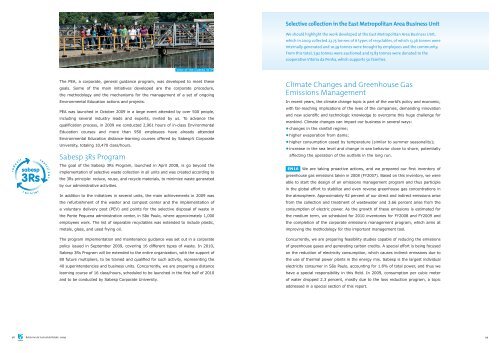
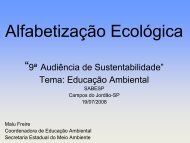
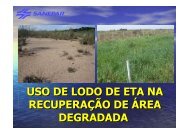
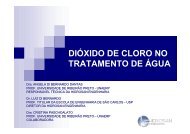
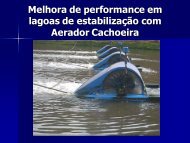
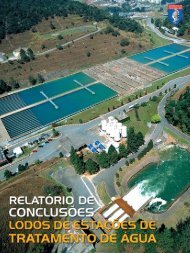
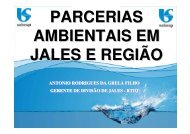
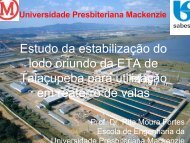
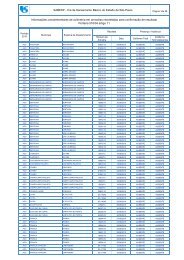
![MBBR ppt for Pulp&Paper, Sabesp, Oct 3, 2008 [Somente leitura]](https://img.yumpu.com/34976291/1/190x135/mbbr-ppt-for-pulppaper-sabesp-oct-3-2008-somente-leitura.jpg?quality=85)
